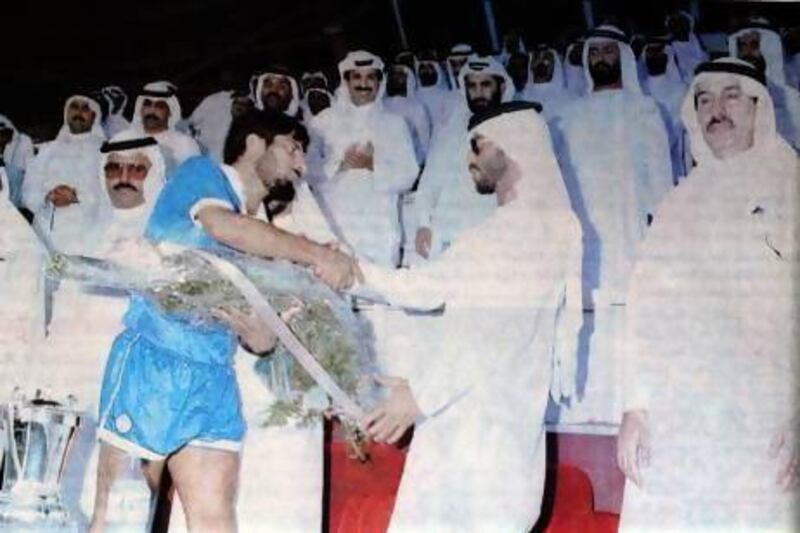In 1945, 26 years before the UAE celebrated its union, a group of young men from Dubai convened at the house of one Mohammed Ali Al Zainal in Al Ghubaiba with the grand idea of establishing the emirate's first football club. And so the club now known as Al Nasr was born.
In the 1950s and 60s, under the name of Al Ahli, the guidance of the Maktoum family saw the club chart a course towards becoming the Dubai institution it is today.
Small steps, at first. After a run of heavy defeats in 1960, one of the players, Ibrahim Jumaa, suggested the club change its name to Al Nasr, literally "victory". In the first match under the new name, Al Nasr defeated Al Nussour (The Eagles) of Deira 12-0. Disheartened by the thrashing, Al Nussour decided to disband and offered their blue shirts to Al Nasr. The transformation was complete.
In a land mostly untouched yet by the astonishing progress of the coming decades, Al Nasr were the blueprint for other sporting clubs. In fact, three other teams also predate the momentous events of December 2, 1971. Al Wasl was established in 1960, Al Ain in 1968, and Al Ahli in 1970.
Until 1973, clubs participated in localised competitions in their own emirate. Nationwide competition would only come with the establishment of the UAE Football League, Sharjah Football Club winning the first title in the 1973/74 season.
Nasr's first title came in 1978, a landmark year for the nation's oldest club. On May 26, 1978, the new Al Maktoum Stadium was inaugurated with the visit of European Champions Liverpool. In the presence of Sheikh Rashid bin Saeed Al Maktoum, the late Ruler of Dubai, and 16 days after the English club had retained the European Cup with 1-0 win over Club Brugge at Wembley Stadium, a capacity crowd of 12,000 fans saw the visitors win 5-0.
Thirty-three years after that meeting of minds in Al Ghubaiba, Nasr were rubbing shoulders with one of the most famous names in world football.
Nasr became more than just a football club. In October 1979, the year a second title was won, Al Nasr Leisureland, a family entertainment and sports complex was opened, solidifying the club's link to the community.
Dubai today is unrecognisable from the city it was in 1979, but Al Nasr Leisureland has remained largely unchanged. For long-time residents, a trip there today is an exercise in nostalgia. The famous ice rink that provided one of the more glamorous activities of the day; the tennis courts and bowling alley; and the outlets led by popular expatriate hangout, The Lodge. Above all the club remains a sporting institution.
The club's indoor facilities would breed basketball, handball and volleyball teams, too. Indeed, current chairman of the club's board of directors, Marwan Ahmad Bin Ghalaita, was himself a professional volleyball player at the club, his current role highlighting an important link with the club's past.
But it is football that continued to define Nasr; and it wasn't always plain sailing. After the late 1970s domination, there were darker days.
In 1980, Don Revie, the former Leeds United and England manager who had been in charge of the UAE national team for three years, took over coaching duties, but his four-year stint failed to bring success.
A 1-0 defeat to Second Division Ajman in the 1984 President's Cup Final at Zayed Sports City was a particular low point. Those in the paltry crowd who made their way back to Dubai in tears, however, did not have to wait long for their team's redemption.
A year later, the cup was won for the first time. A photograph of Sheikh Zayed, the founding President of the UAE, congratulating the team hangs in the lobby of the club's administration as a reminder.
A year later brought a league and cup double, and 1989 bought another cup success. But that would be Nasr's last trophy.
Nasr also memorably contributed to UAE football's finest hour, the 1990 World Cup finals in Italy. It was Nasr's Khalid Ismail who scored one of the country's most famous goals, his left-footed volley against the mighty West Germans briefly making the score 2-1, before the eventual champions went on to win 5-1.
And now, after two decades of false dawns, the club finally look set to challenge for the league title again.
On Thursday night, as the clock hit the 41st minute of Nasr's derby clash at Ahli, the fans of both teams began singing in celebration of the 41st anniversary of the founding of the UAE.
At that very moment, Nasr scored their first equaliser in a match that would end 2-2, leaving the club one point behind leaders Al Ain. It was a poignant moment in the story of a club that continue to carry the weight of their history on their shoulders.
Ahli might have ruled the 1970s. The 1980s belonged to Wasl, nominated the UAE's team of the 20th century. And Al Ain are unquestionably the team of the 21st century.
But in many ways, history will always belong to Nasr. And with some promising results under Walter Zenga and plans to build a museum as a nod to the past, the future could yet be theirs as well.
Follow us
[ @SprtNationalUAE ]





